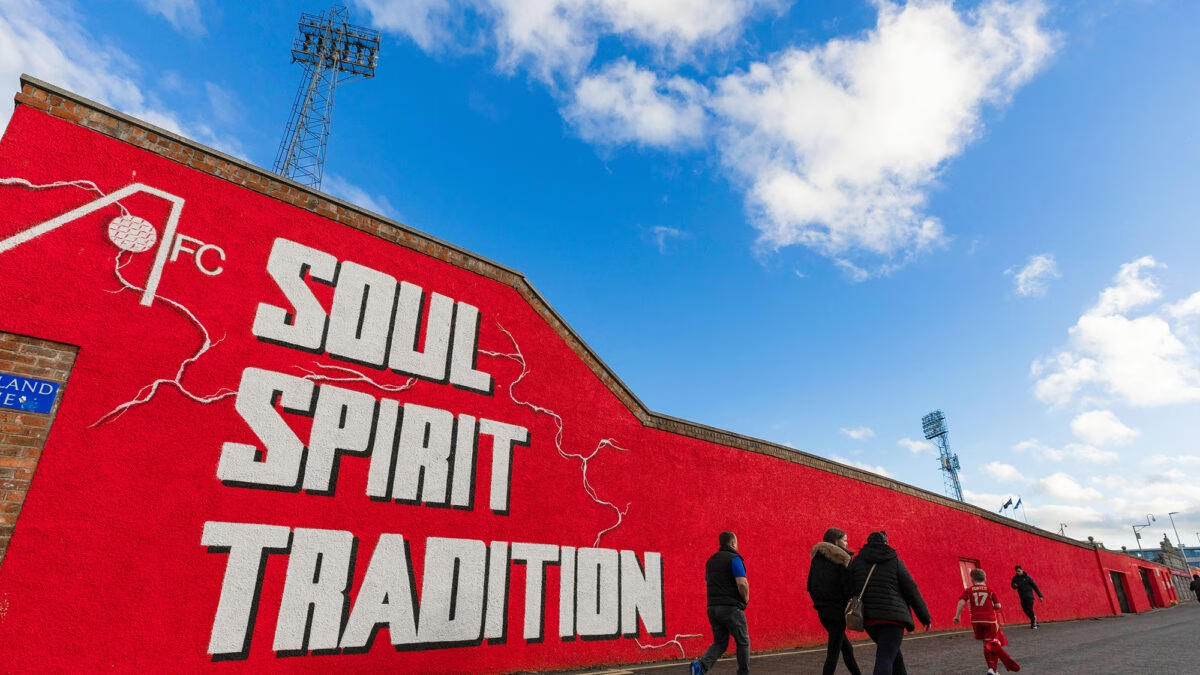News

Aberdeen FC Reveals Record-Breaking Turnover in Latest Accounts
Key highlights:
- Turnover up 49% to £23.6m
- EBITDA is a positive £847,000
- Wages to turnover ratio at a healthy 54%
- Commercial and retail income increased to a record £7 million
Aberdeen Football Club is reporting a record turnover of £23.6 million in its annual accounts for the year ended 30 June 2024. This is an increase of 49% on the previous year’s £15.8million turnover.
EBITDA (earnings before interest, tax, depreciation and amortisation) – a key measure of an organisation’s health and profitability – was a positive £847,000. This is down on the previous year’s EBITDA by £1.8 million due to a £6.1m reduction in gain on player sales, offsetting the additional margin generated from the increased turnover.
The cyclical nature of player trading means that, in the period covered by these accounts, the income from player sales dropped to £1.3 million from £7.4 million the previous year. As a result, the Club reported a modest net loss for the year of £880,000, compared to an operating profit of £1.1m in the previous year. The Club’s record sale of Bojan Miovski to Girona will be included in the 2024/25 accounts.
Commercial and retail sales have grown by 13% to a record £7 million and the wages to turnover ratio reduced from 76% to a healthy 54%.
AFC chairman, Dave Cormack, said: “These robust accounts, showing record turnover and positive EBITDA, underlines the strides the Club is making, both on and off the pitch, towards achieving its strategic goals, most notably growth and football success through financial sustainability. While the increase in turnover is largely due to European group stage football, together with domestic cup runs, it has been bolstered by significant increases in retail and commercial income streams.
“A key criteria of a well-run, financially sustainable Club is the wages to turnover ratio, and, during this period, we are sitting at a very healthy 54%. Our player trading model where we need to carefully balance significant additional investment in football wages and transfer fees against income from player sales, continues to show positive momentum. But, due to the cyclical nature of player sales, the recent real gains will only be reflected in next year’s results.
“Commercial and retail income has grown thanks to the efforts of our driven, motivated commercial and retail teams and the support of our partners: including official Club sponsor, Texo, along with Boskalis, TAQA, RAM Tubulars, GAC and recently EIS Waste Services.”
Mr Cormack also highlighted the growth in the Club’s paid AberDNA initiative – where supporters generously contribute towards the Club’s aim of being the best developer of young players in Scotland. Membership has grown by 31% from 6,100 at the beginning of last season to over 8,000 today. The free AberDNA Under 12 initiative, which aims to nurture the fans of the future, now has more than 11,000 members, mostly primary school children.
Turning to recent attendances, the Chairman commented: “The Club has just sold out Pittodrie for four home games in a row – something never achieved before in our history! The catalyst for these sell-outs is a combination of the team playing well, delivering attacking and entertaining football, together with our long-term investment in fan engagement and fan experience. Between the family section in the Upper Richard Donald Stand, the Red Shed, the colour from our stunning displays and our organised, pre-match pyrotechnics, the whole atmosphere has been lifted, turning Pittodrie into a true fortress.”
The Chairman’s statement in the Club’s annual report provides shareholders with an update on the review of the football operation and the ongoing investment the Club is making every season. As part of the review, the Club engaged the highly respected German football consulting firm, BPTC. The main focus of their review was the transition of academy players, including U18s, to the first team, external player recruitment and player trading.
In his statement, Mr Cormack said: “Each of these facets is interlinked and critical to the Club delivering significant value on the pitch and securing income from player trading so we can reinvest. The Club is investing around £2.2 million each year on its academy, including the Under-18 team. That’s £22 million in today’s money over the next ten years. Whilst winning both the Club Academy Scotland (CAS) Under-16 and Under-18 leagues last season demonstrates success, the key measure must be how many academy players make it to the first team. Our laser focus is now on how we develop first-team-ready players from the academy to deliver a return on our significant investment.”
The Club continues to evolve its strategy for the women’s programme which aims to build a sustainable professional women’s premier league team and girls’ academy in North-East Scotland, with the aspiration of transitioning the women’s team from part-time to full-time professional status while consistently striving to finish in the top 6 of SWPL 1. With the cost of a full-time women’s team and girls’ academy running at around £1.5 million per season, women’s football in Scotland faces significant funding challenges. The Club continues to drive revenues for the women’s programme through sponsorships and partnerships, including the long-term financial commitment from principal sponsor, Boskalis, and new and renewed partnerships with GAC, John Lawrie Metals, Katoni and, most recently, Peterson Energy Logistics, who have become the first official partner of the Club’s newly established Girls’ Academy.
In conclusion, Mr Cormack said: “I’d like to pay tribute to our investors, directors and dedicated staff for all their hard work and efforts in contributing to our financial performance. The incredible, unwavering support of our fans, both at home and away, is also a major contributor which we gratefully acknowledge and never take for granted.”
